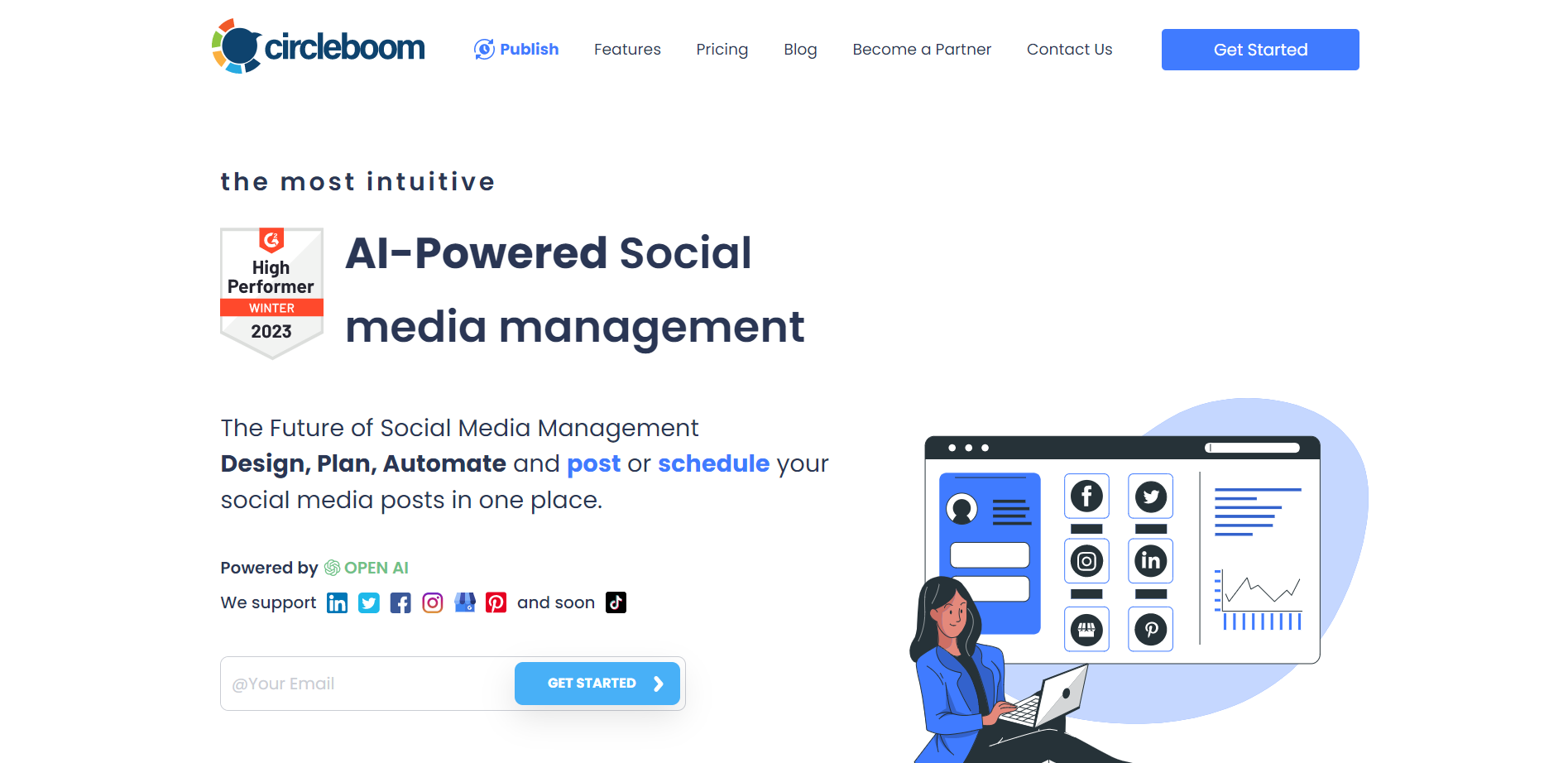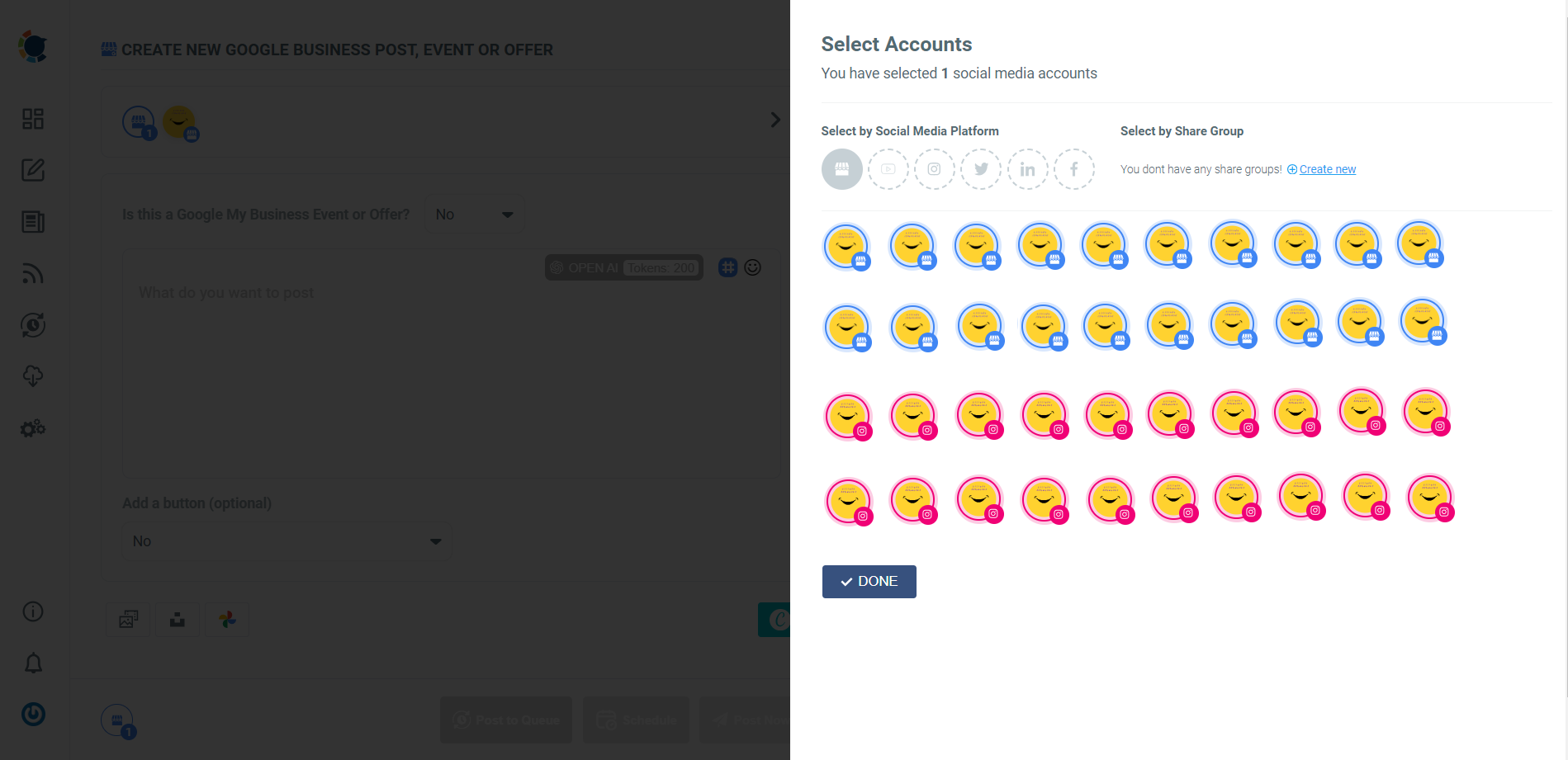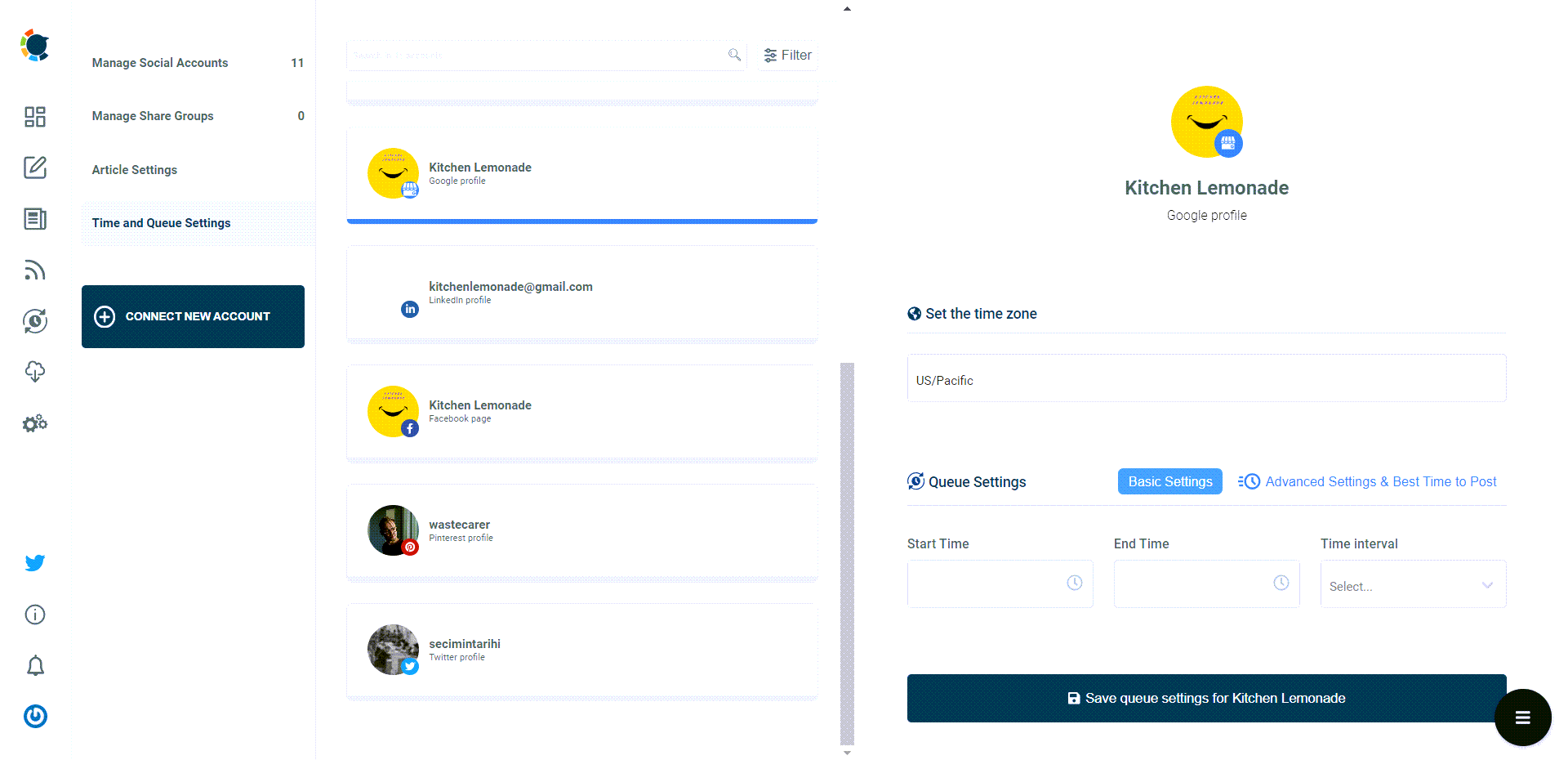Some people are obsessed with reviews. They are right because the existence of reviews increases product purchase rates by 270%. However, this obsession can cause wrong decisions to be made, like buying fake Google reviews.
Don't do this! I will show you how bad can buying fake Google reviews be by telling the real story of Emily and her Café but before coming to it, I should say that you don't need to buy fake Google reviews. Collecting real, honest reviews is actually so easy!
Let me tell you what we did for Circleboom LLC! I should remind you that we are a software company, not a restaurant, cafe, or coiffeur where interacting with customers vis-a-vis is much easier. But, still, it worked!
I am aware that I excited you as if I was going to reveal a huge secret, but actually, it is so simple! We created Google Business Events and Offers, sent emails to spread the news, and presented incentives to make people participate and give us their honest reviews. If you noticed I am not saying positive or negative but honest because pushing people to give you a positive review is not a good tactic! If you do your business properly, their honest reviews will be already positive!
Anyway, we created campaigns repeatedly and the results were amazing! We got more than 5000 views in a month and received more than 100 honest reviews! Even many restaurants can't achieve these numbers! We earned money because many people participated in our offers and events, and left their reviews (mostly positive!). What could be better?
If you too want to create and schedule events and offers on your Google Business accounts, you can utilize Circleboom's effective Google Business Profile Manager! Yes, you can manage multiple accounts in one dashboard!
And if you create campaigns repeatedly, you don't need to prepare them every time. Thanks to the queue scheduling feature of Circleboom, you can set time intervals and let Circleboom share your campaigns automatically!

Google Business Profile Manager - Circleboom!
Create, design, schedule and automate Google posts for multiple accounts at once!
Now let me tell you the dark side of buying fake Google reviews. What happened to Emily and her cute Café is a precious lesson for all marketers and small business owners!
Story of Emily's Café
In a bustling city, nestled between rows of vibrant storefronts, stood a quaint café. Its charm was undeniable, with the aroma of freshly brewed coffee wafting through the air and the warm chatter of contented patrons filling the room. Yet, behind this seemingly idyllic scene lay a tale of temptation and consequences.
Meet Emily, the proprietor of this charming establishment. With her unwavering passion for crafting the perfect cup of coffee, Emily had poured her heart and soul into every aspect of her café. Days turned into nights as she meticulously honed her recipes and ambiance, striving to create an experience that would linger in the memories of her customers.
Despite her dedication, Emily faced a daunting challenge—the visibility of her café in the digital realm. In a world where online reviews held the power to sway potential customers, her café remained obscured by a lack of presence on platforms like Google. Desperate to attract more patrons and compete with bustling neighboring businesses, the idea of buying Google reviews crept into Emily's mind like a beguiling whisper.
One fateful afternoon, Emily stumbled upon an enticing offer promising a swift solution to her visibility predicament, purchase glowing reviews that would instantly elevate her café's reputation. The allure was undeniable; a few clicks and her café would be adorned with five-star praises, drawing in eager crowds seeking the allure of perfection.
The temptation gnawed at her conscience as she teetered on the precipice of a decision that could make or break her business. Yet, a voice within cautioned against this shortcut, reminding her of the values she held dear, authenticity, integrity, and the genuine satisfaction of her customers. But the lure of instant success clouded her judgment.
Little did Emily know that this seemingly innocuous choice would set in motion a series of events that would threaten her café's credibility and the trust and loyalty she had strived to build.
Shall I buy Google reviews? The answer seemed straightforward, but the consequences were yet to unfold.
Driven by the allure of instant success, Emily succumbed to the irresistible offer. With a few swift clicks, her café was adorned with a string of glittering five-star reviews, each praising the ambiance, the flavors, and the unparalleled service. For a brief moment, it seemed like the perfect solution, a shortcut to recognition in the competitive world of cafes and eateries.
Customers trickled in, drawn by the glowing reviews that painted a picture-perfect image of Emily's café. However, the reality behind this facade was far from the idyllic scenes portrayed online. While some patrons enjoyed their visit, others noticed discrepancies between the lavish praise online and their actual experiences.
Word began to spread, not of the delicious aromas or the cozy ambiance, but of the disparity between the online acclaim and the reality within the café's walls. Disgruntled customers, feeling misled by the exaggerated reviews, took to social media and review platforms to express their disappointment.
Soon, the whispers grew louder, echoing across online forums and local community groups. The once-promising influx of customers dwindled, replaced by skepticism and distrust. Emily's café, once bustling with life and promise, now bore the weight of a tarnished reputation.
Google took notice too. Their algorithms, designed to detect fraudulent activities, flagged the sudden surge of reviews as suspicious. In a swift and merciless move, they stripped away those falsely acquired praises, leaving Emily's café stripped of its fabricated glory.
The consequences didn’t end there. Google penalized the café for violating its policies, resulting in a plummeting search ranking and a stark absence from search results. Emily found herself not only battling a tarnished reputation but also facing the wrath of a search engine giant that held the keys to her online visibility.
As weeks passed, Emily grappled with the aftermath of her decision. The allure of quick success had led her down a treacherous path, eroding the trust she had painstakingly built within her community. Her café, once filled with warmth and laughter, now bore the quiet burden of lost opportunities and shattered credibility.
The lesson was a harsh one, buying Google reviews might offer a fleeting moment of triumph, but the repercussions were enduring and devastating. The café that Emily had poured her heart and soul into was now a cautionary tale, a testament to the perils of sacrificing authenticity for temporary gains.
Shall I buy Google reviews? Emily's story stood as a resounding warning, echoing the importance of integrity, authenticity, and the irreplaceable value of genuine customer feedback in the digital landscape. The road to success might be arduous, but shortcuts often lead to paths best left untraveled.
Is there any other alternative? Yes, there is! Instead of buying fake reviews, you can learn the best tips to get real, positive reviews from your real customers! You don't need to be a digital expert! Manage your Google Business with an online social media assistant, create a content calendar, design amazing images, and schedule your posts, and make your customers happy! Happier people will generate better results!

Circleboom - Google Business Manager
Create, design, share, schedule, and automate "Offers" and "Events" for your multiple Google Business Profile accounts!
You shouldn't buy Google Reviews! WHY?

Emily's plight reflects a common dilemma faced by businesses in the digital age—the temptation to buy Google reviews. Her journey highlights the precarious allure of instant gratification versus the enduring consequences of ethical shortcuts.
Thesis Statement:
Exploring the ethical, legal, and long-term consequences of purchasing reviews unveils a multifaceted predicament faced by businesses seeking to bolster their online presence. While the immediate appeal of enhanced visibility and credibility through purchased reviews may seem appealing, the ripple effects of such actions delve into a murky realm fraught with ethical quandaries and potential legal ramifications.
The Ethical Quandary:
The core of the issue lies in the ethical implications of misleading consumers. Purchasing reviews artificially inflates a business's reputation, creating a façade that deceives potential customers. Emily's café, adorned with glowing but dishonest praises, misled patrons, betraying their trust by presenting an exaggerated image. This breach of trust not only undermines consumer confidence but also erodes the fundamental values of integrity and honesty that businesses should uphold.
Legal Ramifications:
Beyond ethical concerns, there exist legal pitfalls when businesses opt to buy reviews. Major platforms like Google have strict guidelines against fake reviews, actively penalizing those who engage in such practices. Emily’s café faced repercussions as Google's algorithms detected the fraudulent activity, resulting in the removal of purchased reviews and severe penalties that impacted the café’s online visibility.
Long-Term Consequences:
Moreover, the fallout from purchased reviews extends far beyond immediate penalties. Emily’s café, once bustling with genuine patronage, now struggled under the weight of a damaged reputation. The fallout didn’t merely affect online visibility but also reverberated through the local community, eroding the trust painstakingly built over time. Long-term success built on a foundation of deceit proves to be unsustainable, as authenticity and genuine customer satisfaction stand as pillars in fostering lasting relationships and sustainable growth.
In essence, the path of buying Google reviews, while seemingly promising quick wins, ultimately leads to a labyrinth of ethical, legal, and long-term repercussions. Emily’s experience serves as a poignant reminder of the pitfalls inherent in sacrificing integrity for momentary gains. As we unravel the layers of this complex issue, it becomes clear that the allure of purchased reviews conceals a myriad of dangers that far outweigh their perceived benefits.
The Allure of Purchasing Google Reviews
Discussion on why businesses consider buying reviews:
The temptation to buy Google reviews stems from the desire for immediate visibility and a competitive edge in the digital marketplace. In a world where online presence significantly influences consumer decisions, businesses often feel compelled to amplify their reputation swiftly. The promise of a quick fix to bolstering visibility and attracting more customers can be enticing, especially for smaller ventures struggling to stand out amidst fierce competition.
Moreover, the fear of being overshadowed by competitors who might already be engaging in such practices can push businesses toward considering this unethical shortcut. The belief that everyone else is doing it and succeeding further fuels the allure of purchasing reviews, creating a self-perpetuating cycle that's hard to resist.
Impact of high ratings on consumer perception and sales:
The influence of high ratings on consumer perception cannot be overstated. Studies consistently show that many consumers rely on online reviews when purchasing. Positive reviews act as social proof, validating the quality and reliability of a business in the eyes of potential customers.
Businesses purchasing reviews aim to capitalize on this phenomenon, creating an illusion of widespread satisfaction to attract more customers. A string of five-star ratings can drive an initial influx of patrons, boosting sales and giving the impression of success. However, this success is built on shaky ground, as the artificially inflated reputation needs to align with the actual customer experiences.
Short-term gains versus long-term repercussions:
The allure of purchasing reviews lies in its promise of immediate gratification—a sudden surge in visibility, an influx of customers, and a boost in sales. However, this comes at a steep cost. Emily's café experienced the fleeting success brought by purchased reviews, only to be confronted with the enduring repercussions that followed.
The short-term gains of enhanced visibility and a brief spike in sales crumbled when faced with the long-term consequences. The damage to reputation, the loss of trust, and the penalties imposed by platforms like Google far outweighed the initial benefits. The lopsided nature of this trade-off becomes apparent—the temporary high of fabricated success pales in comparison to the lasting impact of a tarnished reputation and diminished credibility.
As businesses weigh the allure of purchased reviews against the stark reality of their consequences, it becomes evident that the ephemeral gains hardly justify the enduring damage wrought by unethical practices. In pursuing sustained success, the focus must shift from shortcuts to building a foundation of trust and authenticity that withstands the test of time.
The Dark Side of Fake Reviews

Ethical considerations: Deceiving consumers and breaching trust:
Using fake or purchased reviews raises significant ethical concerns as it deliberately attempts to mislead consumers. According to a 2021 survey by BrightLocal, 91% of consumers aged 18-34 trust online reviews as much as personal recommendations. In 2022, an increased 87% of consumers utilized Google to assess local businesses, marking a rise from 81% in the previous year of 2021. When businesses engage in purchasing reviews, they deceive potential customers, presenting a false image that does not reflect the genuine experiences of patrons.
Take the case of a renowned tech company that faced backlash after being discovered it hired a marketing agency to post fabricated positive reviews for its products. The backlash wasn't just a matter of legality; it struck at the core of consumer trust, tarnishing the company's image and raising doubts about the authenticity of its products.
Legal implications: Violating guidelines and facing penalties:
Platforms like Google, Yelp, and Amazon have stringent policies against fake reviews. Violating these guidelines carries severe penalties, including account suspension, removal of studies, or permanent bans. In 2020 alone, Amazon sued over 1,000 individuals for allegedly posting fake reviews for profit, underlining the seriousness with which these platforms address review manipulation.
In Emily's case, the repercussions were harsh. Google's algorithms identified the artificially inflated reviews, resulting in their removal and penalization. Beyond the loss of these reviews, her café faced a plummet in search rankings and visibility, hampering its online presence and growth opportunities.
Damage to reputation and credibility:
The ramifications of engaging in fake reviews extend beyond immediate penalties. They inflict long-lasting damage on a business's reputation and credibility. Customers who discover discrepancies between online praise and real experiences feel betrayed, losing trust and loyalty.
Statistics from a 2022 survey by Trustpilot reveal that 89% of consumers hesitate to purchase from businesses with negative online reviews. Emily's café, once regarded as a beacon of authenticity, found itself embroiled in a mire of lost credibility and diminished trust within the community. The damage inflicted by fake reviews proved detrimental and arduous to overcome, serving as a cautionary tale for businesses contemplating such unethical shortcuts.
The dark side of fake reviews isn't merely an ethical dilemma; it encompasses legal ramifications and irreversible harm to a business's reputation. As the landscape of online reviews evolves, the repercussions for engaging in deceptive practices continue to loom large, emphasizing the indispensable value of authenticity and ethical conduct in fostering genuine consumer trust.
Authenticity and Trust
Importance of genuine feedback and its impact on business growth:
Genuine feedback serves as the lifeblood of business growth in the digital age. Authentic reviews offer invaluable insights into a business's strengths and areas needing improvement. According to a study by Spiegel Research Center, products with reviews are 270% more likely to be purchased than those without. Real feedback not only influences consumer decisions but also aids businesses in refining their products or services, thus fostering continuous improvement and evolution.
Do you know how to respond Google reviews, negative or positive? If you don't, you can use a Google Review Respond Generator, and find the best words for your reviews:

Building trust through transparency and authenticity:
Transparency and authenticity form the bedrock of trust in today's consumer landscape. When businesses prioritize authentic feedback, they showcase a commitment to transparency, honesty, and customer-centric values. Brands that openly embrace genuine feedback, both positive and constructive, earn the trust of consumers. This trust forms a robust foundation for long-term relationships, fostering loyalty and advocacy among customers.
Strategies for acquiring real, organic reviews:
Acquiring authentic reviews involves cultivating genuine interactions with customers. Encouraging satisfied customers to share their experiences organically can be achieved through various strategies:
- Requesting feedback: After a purchase or service, politely requesting feedback via email or within the establishment itself can encourage customers to share their thoughts.
- Soliciting reviews on multiple platforms: Inviting customers to leave reviews on platforms they prefer, be it Google, Yelp, or industry-specific review sites, broadens the reach and credibility of feedback.
- Incentivizing feedback: Offering incentives, such as discounts on future purchases or entries into a giveaway, in exchange for honest reviews can motivate customers to share their experiences.
- Facilitating easy review processes: Streamlining the review process by providing clear instructions and links, making it effortless for customers to leave feedback, and encouraging participation. For example, consider automating a review request after a positive customer experience with your enterprise contact center. This will make the process much easier for your customers and urge them to leave a review right away.
- Engaging with customers: Actively engaging with customers on social media, responding to reviews, and addressing concerns publicly demonstrates attentiveness and commitment to customer satisfaction.
By focusing efforts on soliciting genuine feedback and fostering authentic customer relationships, businesses can cultivate a repository of real, organic reviews. These reviews not only enhance credibility but also act as a testament to a business's commitment to excellence and customer satisfaction.
Incentivizing Authentic and Positive Reviews

Creating incentives for genuine feedback:
Instead of resorting to purchasing fake reviews, businesses can foster a culture of authentic feedback by incentivizing customers to share their experiences. Offering incentives for genuine, honest reviews not only encourages customers to participate but also rewards their loyalty and engagement.
Imagine a small local bakery struggling to garner online reviews. Determined to boost their online presence authentically, they decided to incentivize customers. They offer a free pastry or a discount on the next purchase in exchange for leaving a genuine review of their experience. This approach not only motivates customers to provide feedback but also creates a positive association between the bakery and the patrons.
Using Circleboom's Google Business Profile Manager to drive positive reviews:

Imagine a local boutique fitness studio striving to expand its reach in the competitive fitness industry. By leveraging Circleboom's Google Business Profile Manager, they strategically craft compelling "Offer" and "Event" posts. These posts highlight exclusive deals such as "One-Week Free Pass for New Members" or "Fitness Challenge Kick-off Event."
As a result, the studio witnessed a remarkable 40% increase in sign-ups and foot traffic within a month. Over this period, they observed a substantial 25% surge in class attendance, translating to a substantial boost in revenue.
As attendees immerse themselves in invigorating workout sessions and experience personalized coaching, they eagerly share their positive experiences online. This engagement, fueled by the studio's enticing offers and vibrant events, leads to a notable 30% increase in organic, positive reviews across Google.

How Circleboom helps businesses grow
Through Circleboom's user-friendly platform, this fitness studio strategically taps into the potential of its Google Business Profile. The tangible growth in sign-ups, and attendance, and the surge in positive reviews substantiate the studio's commitment to providing exceptional fitness experiences.
If you want your business to rank higher on Google and increase visibility, you should optimize your Google Business Profile.
Google My Business Optimization Checklist
- Complete the setup process correctly ( Verify and Claim your account)
- Choose a good logo and interior/exterior images.
- Be active and post regularly on Google My Business.
- Launch Campaigns and Events frequently.
- Keep your hours accurate.
- Manage & Respond to reviews
- Share your business developments on other social media channels.
By harnessing tools like Circleboom's Google Business Profile Manager to craft alluring offers and engaging events, and scheduling Google posts, businesses can witness quantifiable growth in customer engagement and organic reviews. Happy clients, drawn in by exclusive offerings and vibrant events, organically contribute genuine reviews that amplify the business's reputation and attract a dedicated clientele.
Circleboom's queue scheduling feature helps you automate your Google posts and reduce the time that you will spend creating and sharing content for your multiple Google Business Profile accounts. You will set time intervals and watch Circleboom share your posts automatically!

Circleboom's dynamic integration of Canva and ChatGPT empowers businesses to craft stunning Google posts that captivate audiences and drive substantial traffic. With Canva's intuitive design tools seamlessly integrated into Circleboom's platform, companies gain access to a treasure trove of customizable templates and creative elements, allowing for eye-catching, professional designs tailored to their brand.
AI will ease every aspect of social media management and Google Business Profile is not an exception! If you choose your AI assistant for social media correctly, you can easily level your experience up!

ChatGPT's AI prowess also enriches content creation, offering intelligent suggestions and refining messaging to resonate with target audiences effectively. This powerful synergy enables businesses to effortlessly create compelling Google posts that stand out and entice and direct traffic, enhancing online visibility and engagement.

What is the best time to post on Google Business Profile?
Circleboom has an amazing function that provides its users with "user-specific" best times to post. Yes, there is a general schema of the best time to post on Google Business, based on Circleboom users.

In addition to that, every user sees his/her "tailored best time" to post when their post is ready to share or schedule.

For Google Business Profile management, Circleboom is the best but not the sole option. There are other, AI-powered Google Business management tools that you can utilize to craft, share, schedule, and automate your Google posts for multiple Google Business accounts!
Conclusion
Emily's story is like a big red flag about buying Google reviews. Her café went downhill fast. Buying reviews didn't just hurt their online shops; it made people stop trusting them. Being genuine and doing the right thing isn't just good; it's super important for success. Emily's story tells other businesses, like the fitness place, what not to do. This fitness boutique had the tips and tool and increase its traffic and revenue in the safest way!
Being honest and listening to customers isn't just lovely; it's the smart way to go. Circleboom is a superb way for businesses to get noticed without doing tricky stuff. Here's the deal:
- Be really excellent at what you do.
- Nurture real connections.
- Always do the right thing and grow trust with your customers.






